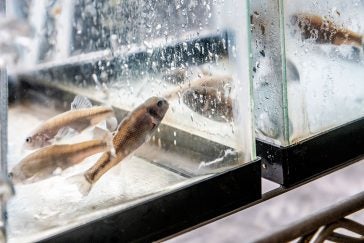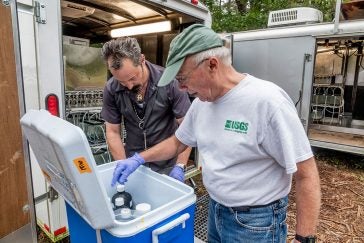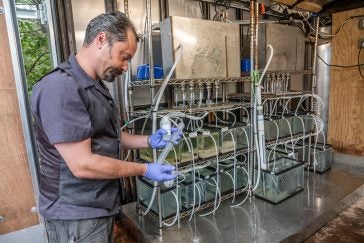
If you have cast a line in a freshwater pond or stream on Cape Cod, there is a good chance you baited your hook with a fathead minnow to lure in a trophy trout or bass. But did you know that those minnows also help researchers better understand human health?
The fathead minnow—or Pimephales promelas to those fond of Latin nomenclature—is a “model organism,” meaning that researchers and regulatory agencies use these small fish to study the effects of toxic chemicals on animals. This field of study is known as ecotoxicology, and the results gleaned from research on fathead minnows can inform regulatory agencies as they set guidelines and limits on chemicals to protect human health. In fact, fathead minnows are one of the dominant models in freshwater ecotoxicology.
On Cape Cod, these common fish can provide information on the impacts of varying levels of PFAS—poly- and perfluoroalkyl substances—that are at the center of STEEP research. STEEP researcher Alan Vajda at the University of Colorado-Denver along with Denis LeBlanc and other research partners at the US Geological Survey are bringing science to the field—quite literally—to study the effects of PFAS on fathead minnows.
 In August 2018, Vajda towed a mobile fish laboratory to the coastal shores of Barnstable County, Cape Cod. He filled rows of tanks with hundreds of fathead minnows and exposed those fish to water from different local sources that have varying levels of PFAS. The research team made sure the other environmental factors the fish were exposed to stayed consistent—temperature, amount of light, type of food, etc.
In August 2018, Vajda towed a mobile fish laboratory to the coastal shores of Barnstable County, Cape Cod. He filled rows of tanks with hundreds of fathead minnows and exposed those fish to water from different local sources that have varying levels of PFAS. The research team made sure the other environmental factors the fish were exposed to stayed consistent—temperature, amount of light, type of food, etc.
By controlling the variables, the researchers were able to make sure the only difference between individual fish was the levels of PFAS that are present in each of the water sources. That way, any metabolic or developmental differences in the fish are most likely a result of varying PFAS levels and not other environmental factors.

Although Vajda and LeBlanc recently wrapped up the field exposure portion of their experiment, the hard part was still to come. Dr. Vajda and his research team will evaluate tens of thousands of data points for patterns in fish responses, and determine if those responses are caused by PFAS in the water. If so, then these fathead minnows will have earned our gratitude for the critical part they played in advancing our understanding of how other animals—including humans—may respond to PFAS.

